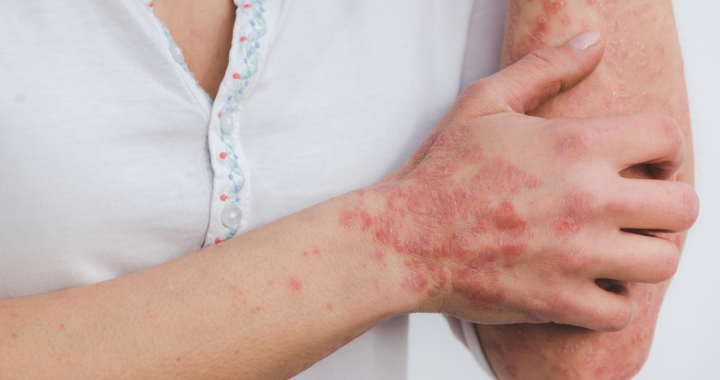Although psoriasis affects more than 7.5 million people in the United States, we’re still often asked, “What is psoriasis?” and “What are the causes of psoriasis?” Psoriasis is a common skin disorder that causes skin cells to multiply 10 times faster than necessary, leading to a build up that causes bumpy red patches with scaly white skin. As for the causes of psoriasis? Keep reading to find out.
Psoriasis Overview
There are actually many types of psoriasis, including erythrodermic psoriasis, guttate psoriasis, inverse psoriasis, plaque psoriasis, and pustular psoriasis. Plaque psoriasis is the most common type of psoriasis. Plaques of red skin, often covered in silver-colored scales, are the main symptom of plaque psoriasis. These plaques may also be itchy and painful and can begin to crack and bleed.
Psoriasis is a chronic disease that currently has no cure. However, it does tend to go through cycles, with flares that can last a few weeks to a few months. Understanding triggers to psoriasis can help treat and prevent flare ups, so we’ll discuss some causes of psoriasis, as well as common triggers, further on in this blog.
What Causes Psoriasis?
While we know that psoriasis causes skin cells to grow faster than usual, doctors aren’t quite sure of the exact causes of psoriasis. However, many believe that the immune system mistakenly attacks healthy skin cells with infection-fighting cells.
Is Psoriasis Contagious?
No, psoriasis is not contagious, but researchers and doctors believe that genetics and environmental factors do play a role in who develops psoriasis. You have a higher risk of developing psoriasis if a parent, grandparent, or sibling has psoriasis.
What Causes Psoriasis to Flare Up?
Triggers are often to blame for psoriasis flare ups, so knowing common psoriasis triggers can help you modify your lifestyle to avoid as many triggers as possible. Common triggers of psoriasis include:
- Stress
- Weather, especially if where you live is cold and dry
- Heavy consumption of alcohol
- Certain medications, such as lithium or high blood pressure medicine
- Suddenly discontinuing corticosteroids
- Smoking or exposure to cigarette smoke
- Infections
- Friction on deep skin folds (like behind the knees or elbows)
- Skin injuries such as scrapes, bug bites, or severe sunburns
Does Psoriasis Itch?
Yes, psoriasis does cause your skin to itch. Many describe this itching as a burning or biting sensation that is also painful. Although there are no treatments that can cure your triggers or causes of psoriasis, psoriasis treatment can help control symptoms like itching.
Psoriasis Treatment in Pittsburgh
The goal of psoriasis treatment is to slow the growth of skin cells while also removing scaly skin. Before prescribing a psoriasis treatment regimen, your dermatologist will rule out a skin infection or other skin disorder. Throughout your treatment, your dermatologist will also help you determine the triggers and causes of psoriasis to better help prevent future flare ups.
Common psoriasis treatments include steroid creams, moisturizers, coal tar, retinoid creams, light therapy, or medications. Let’s take a more in-depth look at some of your psoriasis treatment options.
1. Creams and Ointments
Corticosteroid creams are the most common topical treatment used for mild or moderate psoriasis. During an active flare up, corticosteroids are applied daily, but then reduced to every other day or only on weekends once in remission.
Topical forms of Vitamin D can be used to slow skin cell growth alone or in conjunction with topical corticosteroids. Retinoids may also be prescribed, but skin irritation and increased light sensitivity may not allow retinoids to be an option for everyone.
2. Light Therapy
Although excessive exposure to light can trigger psoriasis, light therapy is often used to help treat psoriasis. Your dermatologist will work with you to determine the best amount of light exposure, whether this is brief, daily exposure to the sun or treatment with artificial sources of light.
3. Medication
Oral options are available such as Otezla and Sotyktu. Newer biologic injectable medications such as Tremfya, Taltz, Cosentyx, and Skyrizi give patients a chance to achieve clear or nearly clear skin.
Here at Vujevich Dermatology Associates, our Psoriasis Treatment Center is a state-of-the-art facility that specializes in the latest psoriasis treatment options. Our expert dermatologists understand how a chronic condition such as psoriasis can be physically and mentally draining, and we work with you to develop specialized treatment regimens tailored to you. The Psoriasis Treatment Center is here to help you control, manage, and treat your psoriasis to improve your quality of life while living with psoriasis.
If you need help managing the symptoms and causes of psoriasis, schedule an appointment with our expert dermatologists at the Psoriasis Treatment Center. You can reach our team at 412-429-2570 or visit our contact page to book your appointment. You can also follow us on Facebook to see what’s new in the world of dermatology.

